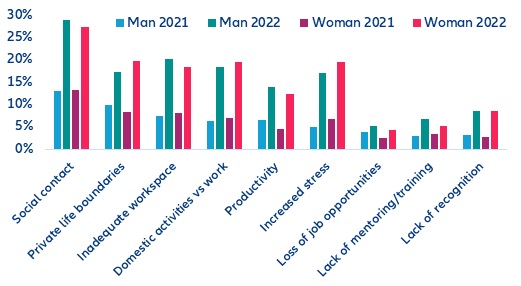- In 2020, the pandemic made working from home the norm for millions of employees in the EU. Two years later, how do they feel about remote working? In our 2022 Allianz Pulse survey, we asked 1,000 respondents each in Germany, France and Italy about their perceptions of the benefits and challenges.
- Compared to the previous round of the survey, the share of employees that reported not being able to work from home decreased in all three countries. Nonetheless, the share of those going back to the office also increased in both the hybrid and mostly full-time formats: 32% in Germany and Italy, and 29% in France (compared to 25% in all three countries the year before).
- The benefits of remote working are clear: Respondents mostly cited the elimination of commuting (men: 51%, women: 58%), time flexibility (49%) and lower costs (men: 26%, women: 28%), amongst others.
- However, the share of respondents citing challenges increased twofold in almost all categories: two years of working from home has clearly sharpened the awareness of the downsides. Social contact and lack of networking opportunities was the top challenge (men: 29%, women: 27%), followed by blurred private life boundaries (men: 17%, women: 20%), inadequate workspace (men: 20%, women: 18%), juggling domestic activities with work responsibilities (men: 18%, women: 20%) and reduced productivity (men: 14%, women: 12%).
- Working remotely is not a “one size fits all” solution. The double shift for women overshadows the flexibility of working from home, and the digital divide (internet access, digital skills, and internet usage) could widen inequality. Policymakers and employers need to keep these considerations in mind when designing the future of work.
Remote Work
Is the honeymoon over?
Employees are taking off the rose-tinted glasses when it comes to remote working
In 2020, the pandemic made working from home the norm for millions of employees. Since then, the future of work has moved into the spotlight of public and policy interest, from tech moguls issuing ultimatums to teleworkers via e-mail to countries making remote work a legal right. But how do employees feel about working from home, and have their perceptions changed since the onset of the pandemic? In our2022 Allianz Pulse survey, we asked 1,000 respondents in Germany, France and Italy about their perceived benefits and challenges of teleworking.
Compared to the previous round of the survey, the share of employees that reported not being able to work from home decreased in all three countries. Nonetheless, the share of respondents going back to the office also increased both in the hybrid and mostly full-time formats: 32% in Germany and Italy and 29% in France (compared to 25% in all three countries the year before).
Perceived challenges regarding remote work, by gender (%)
